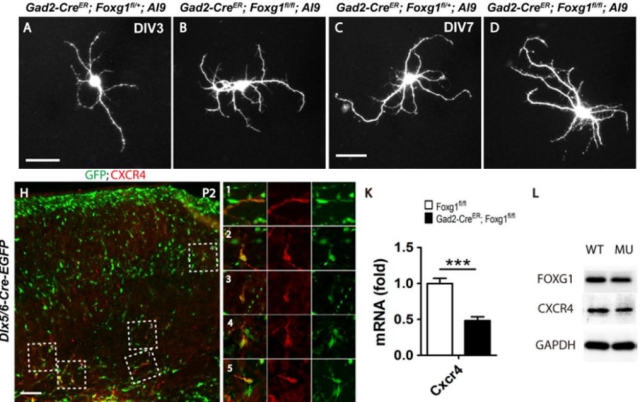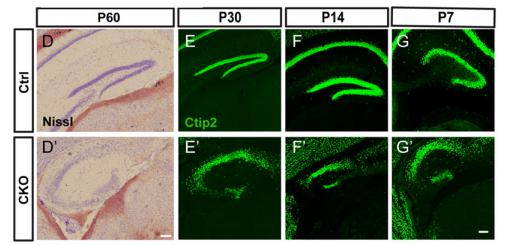Recently new findings from Professor Chunjie Zhao’s group are published in Cerebral Cortex, providing new insights into the mechanisms of the development of cortical interneurons and the dentate gyrus.
1 Foxg1 Regulates the Postnatal Development of Cortical Interneurons (Cerebral Cortex, 2018, doi: 10.1093/cercor/bhy051).
Abnormalities in cortical interneurons are closely associated with neurological diseases. Most patients with Foxg1 syndrome experience seizures, suggesting a possible role of Foxg1 in the cortical interneuron development. By conditional deletion of Foxg1, which was achieved by crossing Foxg1fl/fl with the Gad2-CreER line, this group found the postnatal distributions of somatostatin-, calretinin-, and neuropeptide Y-positive interneurons in the cortex were impaired. Further investigations revealed an enhanced dendritic complexity and decreased migration capacity of Foxg1-deficient interneurons, accompanied by remarkable downregulation of Dlx1 and CXCR4. Overexpression of Dlx1 or knock down its downstream Pak3 rescued the differentiation detects, demonstrated that Foxg1 functioned upstream of Dlx1-Pak3 signal pathway to regulate the postnatal development of cortical interneurons. Due to the imbalanced neural circuit, Foxg1 mutants showed increased seizure susceptibility. These findings will improve our understanding of the postnatal development of interneurons and help to elucidate the mechanisms underlying seizure in patients carrying Foxg1 mutations. Drs. Wei Shen and Ru Ba contributed to this work equally.

2 PDK1 Deficit Impairs the Development of the Dentate Gyrus in Mice (Cerebral Cortex, 2018, doi: 10.1093/cercor/bhy024)
3-Phosphoinositide-dependent protein kinase-1 (PDK1) is crucial for the development of the dentate gyrus (DG), the first gateway receiving afferent inputs from the entorhinal cortex. However, the role of PDK1 in DG development is unclear. In the present study, by crossing Pdk1fl / fl mice with the Emx1-cre line, we identified that the ablation of PDK1 disrupted the development of DG via decreasing the proliferation, and increasing the differentiation of dentate neural progenitor cells, downregulating AKT activity and upregulating GSK3β signaling. Moreover, PDK1 deletion disrupted the distribution of Reelin+ cells and decreased the level of Reelin mRNA which may contribute to the defective migration of progenitor cells and the disrupted radial glial scaffolds. Furthermore, the inhibition of GSK3β activity partially restored the decreased proliferation of primary neural stem cells in vitro. Taken together, our data indicated that the ablation of PDK1 affected the proliferation and differentiation of dentate neural progenitor cells in mice. Drs. Min Xu and Xiaoning Han contributed to this work equally, and this work collaborated with Professor Jun Gao at Nanjing medical university.



